VANCOUVER, BC / ACCESSWIRE / April 18, 2024 / Torq Resources Inc. (TSX-V:TORQ)(OTCQX:TRBMF) ("Torq" or the "Company") is pleased to announce the first set of results from the recently completed phase II drill program at its Santa Cecilia project, located in the prolific Maricunga belt, in the Atacama region of Chile. The program consisted of approximately 1,500 metres (m) over three diamond drill holes; two located at the Pircas Norte target and one at the Gemelos Norte target. Drill hole 24SC-DDH-003 intercepted 0.36 g/t gold (Au) and 0.078% copper (Cu) over 502 m from 98 m down hole, including a higher-grade interval of 0.69 g/t Au and 0.10% Cu over 20 m from 354 m down hole at Pircas Norte (Table 1). The drill hole ended in mineralized intrusive diorite breccia due to logistical limitations and the reported intercept remains open. These results represent a new discovery of significant gold-copper porphyry mineralization and confirm the Company's exploration thesis for the broader Santa Cecilia project. Results from drill holes 24SC-DDH004 and 24SC-DDH005 are expected in the coming weeks.
A Message from Shawn Wallace, CEO and Chair:
"We are thrilled to announce a significant gold and copper discovery at the Pircas Norte target at our flagship Santa Cecilia project located in Chile's storied Maricunga belt. This discovery, made in our first drill hole of the second phase of drilling, our third ever drill hole on the project, underscores the immense potential of the untested copper porphyry targets at Santa Cecilia, which are all located within proximity, and within the same hydrothermal alteration system, as Newmont & Barrick's Caspiche deposit, which is part of one of the largest undeveloped gold projects in the world.
"This achievement marks a pivotal moment for Torq Resources as it supports our primary exploration thesis that mineralization from the Caspiche deposit may extend onto the Santa Cecilia property. We are incredibly grateful to be the first junior exploration company to test this theory, as the project was primarily dormant for the better part of 30 years until we acquired the option for ownership. We are excited to continue our exploration efforts and unlock the full potential of Santa Cecilia, further solidifying our position as a key player in the exploration of Chile's most prolific mining belts."
Detailed Discussion:
The Santa Cecilia project is host to a 10 square kilometre (km) hydrothermal alteration footprint which contains a cluster of Au-Cu porphyry targets. The identified Au-Cu porphyry targets are mineralized either on surface or at shallow depths across approximately 4 km of strike length with very limited to no drilling completed, providing the Company with the opportunity to discover large-scale porphyry-style mineralization at or near surface through drilling (Figure 1). Norte Abierto's Caspiche porphyry gold-copper deposit, which is held in a 50/50 joint venture by Newmont and Barrick is hosted within the same broad hydrothermal alteration footprint that extends onto Santa Cecilia.
Of the three drill holes completed in the phase II drill program, two were located at the Pircas Norte target and consisted of approximately 600 m (24SC-DDH-003) and 496 m (24SC-DDH-005), respectively, and 404 m (24SC-DDH-004) was drilled at the Gemelos Norte target. The Pircas Norte and Gemelos Norte targets are located within 1 - 2 km of the Caspiche deposit. Pircas Norte has the largest footprint of observed porphyry mineralization at Santa Cecilia, measuring approximately 300 m x 400 m (Figure 2). Most of the Pircas Norte area is covered by colluvium, however selective rock samples have returned values between 0.35 g/t Au and 1.43 g/t Au, 0.09% Cu and 0.47% Cu, and irregular anomalies of up to 4 ppm Mo. The absence of epithermal indicators in the overburden suggests that Pircas Norte could host a shallow porphyry system which may be easier to access. In the southern region of Pircas Norte, the porphyry zone is in fault contact with the 600 m in diameter Pircas dacite dome system.
Drill hole 24SC-DDH-003, intersected 90.8 m of phreatomagmatic breccias, as well as the mineralized Pircas Norte porphyritic intrusive complex, which was present to the end of the hole. Besides the gold-copper-molybdenum porphyry style mineralization present in the area, the drilling has shown late-stage gold-zinc mineralization, represented by pyrite, chalcopyrite, low-iron sphalerite and galena veins.
The units intersected may be summarized as follows (Figure 3):
- Phreatomagmatic breccias: associated with the Pircas dacite dome system, from surface to 90.8 m.
- Quartz diorite porphyry: from 90.8 m to 226 m, an irregular interval, including quartz diorite intrusive breccia at different levels and strong local faulting. In this section, a 62 m interval stands out (102 m to 164 m) averaging 0.49 g/t Au, 0.16% Cu and 12 g/t Mo. The interval shows mainly fault breccia and a late-stage polymetallic vein.
- Diorite porphyry (amphibole-biotite): from 226 m to 432 m, possibly a late intrusive phase, sparsely veined and low-grade (approximately 0.15 g/t Au, on average), including 34 m (282 m to 316 m) of fault breccia with veined porphyry clasts which returned 0.43 g/t Au and 0.082% Cu and 0.29% Zinc (Zn). Additionally, a large slab of intrusive diorite breccia from the underlying unit was intercepted, from 354 m to 374 m, and returned results of 0.69 g/t Au, 0.1% Cu and 5.6 g/t Mo over 20 m.
- Intrusive diorite breccia: from 432 m to 600 m (end of hole): brecciated, densely veined diorite porphyry phase, with frequent small fragments of Paleocene basement. The average grade was 0.46 g/t Au and 0.088% Cu.
Drilling stopped in mineralization due to logistical limitations.
Table 1: Highlights of Torq's drill results from its first drill hole at the Pircas Norte target at the Santa Cecilia gold-copper project, targeting porphyry mineralization:
Hole ID | From (m) | To (m) | Length (m) | Au (g/t) | Cu (%) | Mo (ppm) | |
24SC-DDH-003 | 98 | 600 | 502 | 0.36 | 0.078 | 7.7 | |
incl. | 66 | 72 | 6 | 0.37 | 0.009 | 24.9 | |
and | 102 | 164 | 62 | 0.49 | 0.158 | 11.6 | |
and | 188 | 248 | 60 | 0.39 | 0.088 | 12.4 | |
and | 254 | 258 | 4 | 0.26 | 0.028 | 1.7 | |
and | 282 | 316 | 34 | 0.43 | 0.082 | 7.1 | |
and | 340 | 348 | 8 | 0.22 | 0.105 | 4.6 | |
and | 354 | 374 | 20 | 0.69 | 0.1 | 5.6 | |
and | 432 | 596 | 164 | 0.46 | 0.088 | 8.4 | |
Main interval is selected using Au grade*thickness no less than 0.5 g/t*m with average interval grade no less than 0.1 g/t, maximum consecutive dilution 6 m; Sub-intervals are selected using Au grade*thickness no less than 1.0 g/t*m with average interval grade no less than 0.2 g/t, maximum consecutive dilution 4 m; True widths of mineralization are unknown based on current geometric understanding of the mineralized intervals | |||||||
Next Steps:
The Company is expecting the assays from the remaining two drill holes in the coming weeks. Once those have been received, Torq's technical team will complete detailed geological modeling of the porphyry system to refine additional drill targets at Pircas Norte and Gemelos Norte. The Company plans to resume drilling in Q4 of this year, subject to financing.
Corporate Updates:
The Company is also announcing the resignation of Natasha Frakes, VP, Communications, as she moves on to pursue new opportunities. Ms. Frakes' last day with the Company will be April 30, 2024.
In addition, further to the Company's news release on February 28, 2024, announcing it has engaged ITG as a market maker, the Company confirms that ITG is solely using its own capital for all market-making activities.
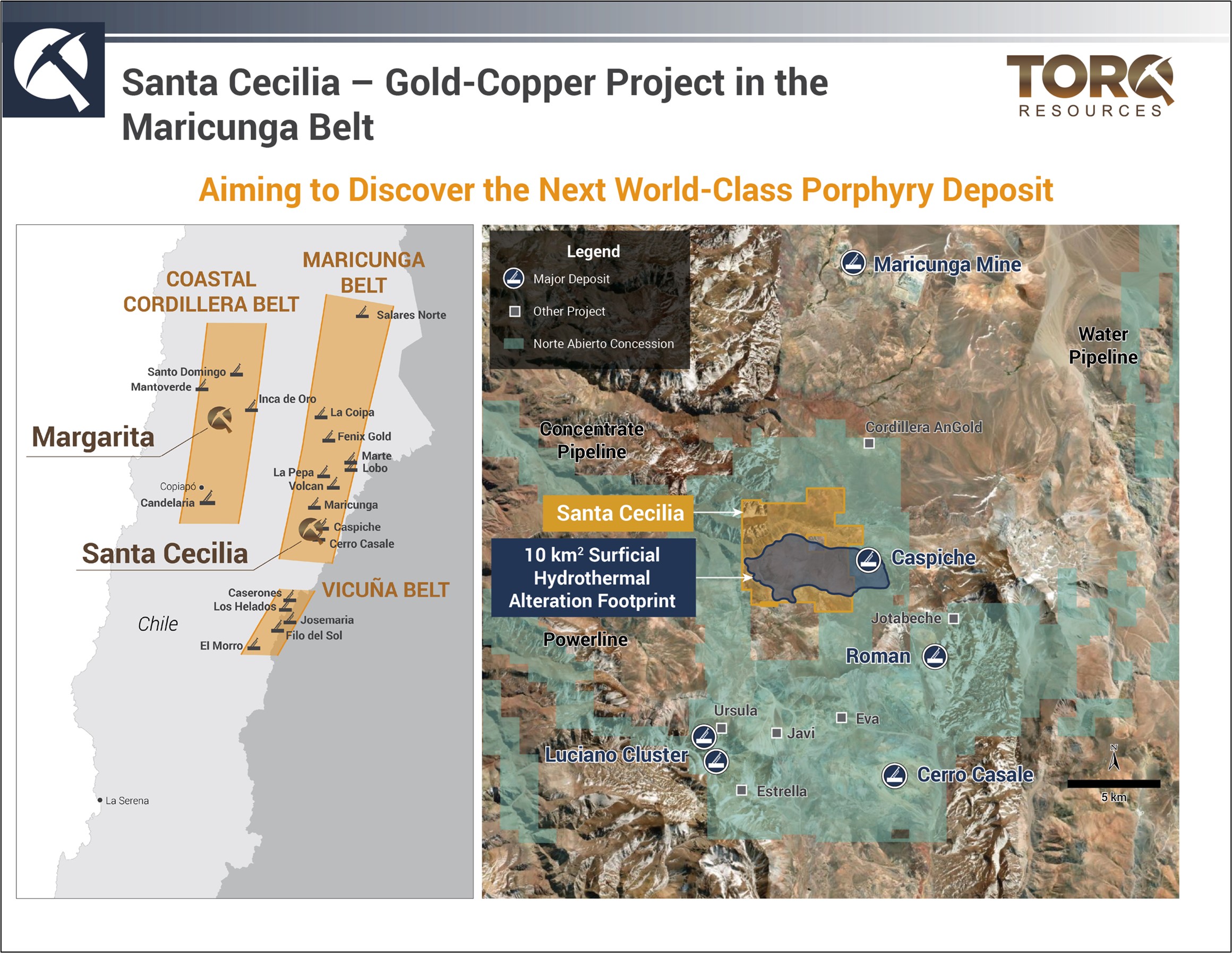
Figure 1: Illustrates the location of the Santa Cecilia project in the Maricunga belt and in relation to the Norte Abierto joint venture, held by Newmont and Barrick, which consists of the Caspiche and Cerro Casale deposits.
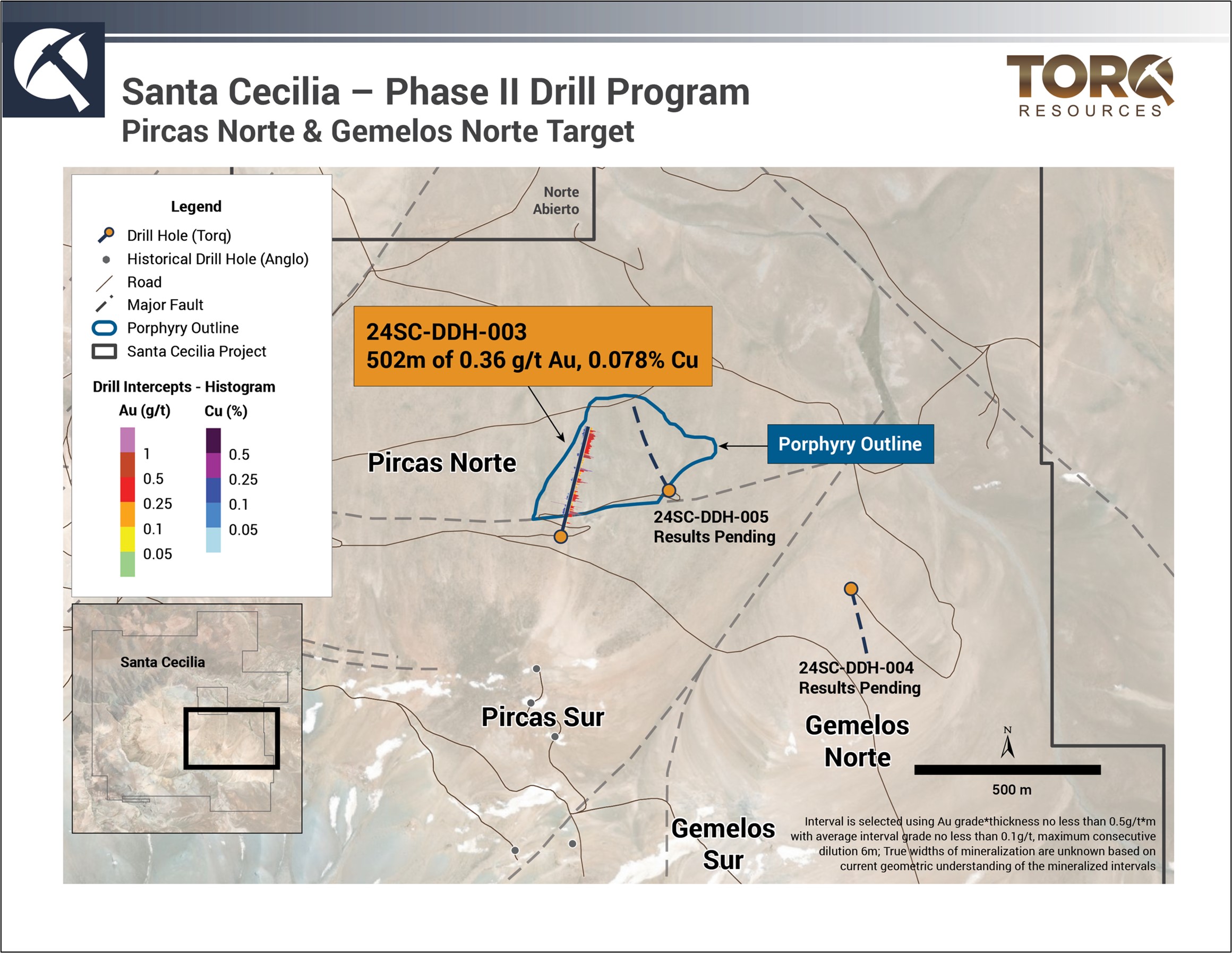
Figure 2: Illustrates the Pircas Norte and Gemelos Norte targets and the location of the three drill holes in the recently completed drill program.
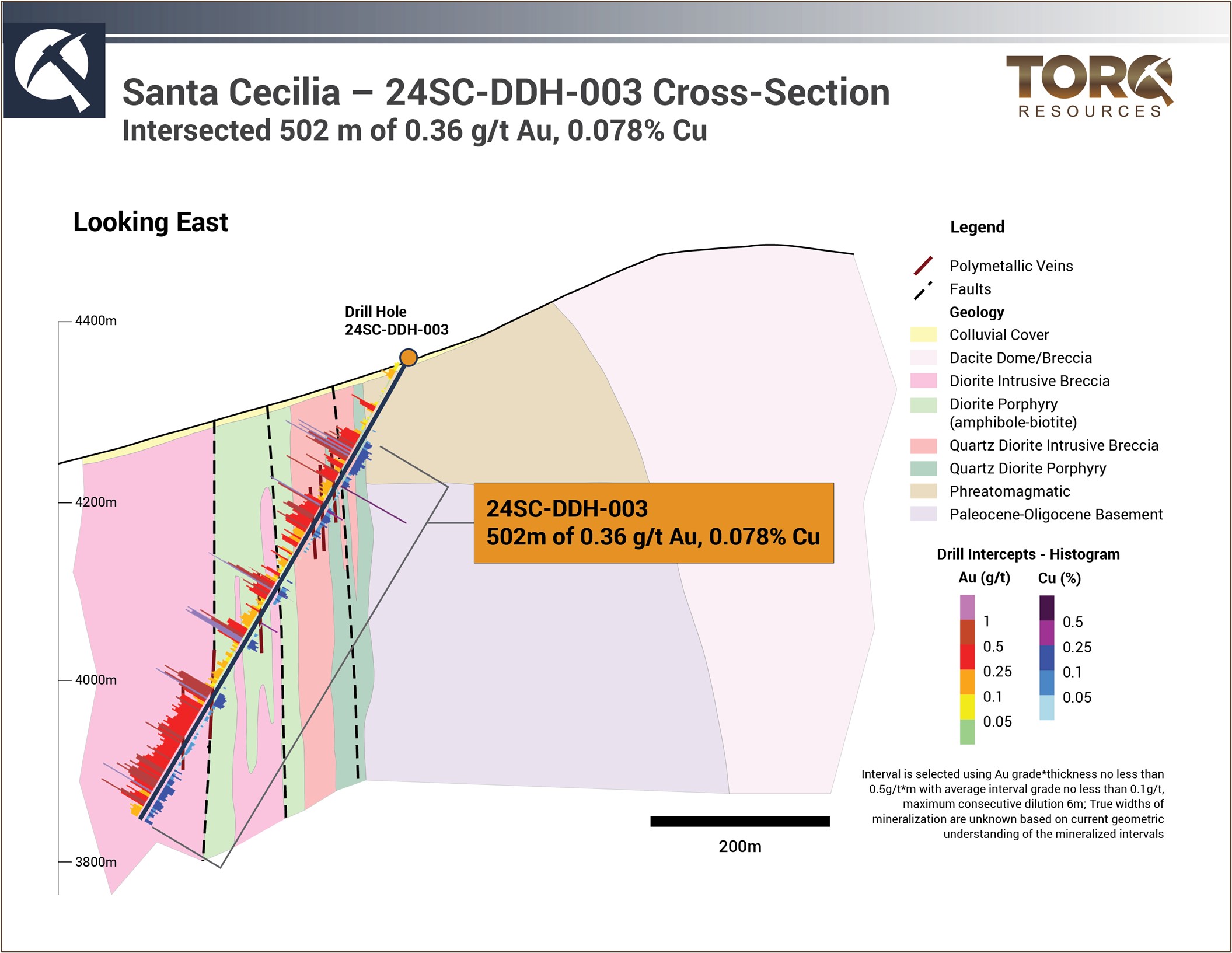
Figure 3: Illustrates the first drill hole (24SC-DDH-003) at the Pircas Norte target with a histogram that demonstrates the distribution of copper and gold, which is strongest in the deepest portion of the drill hole, which bottomed in mineralization.
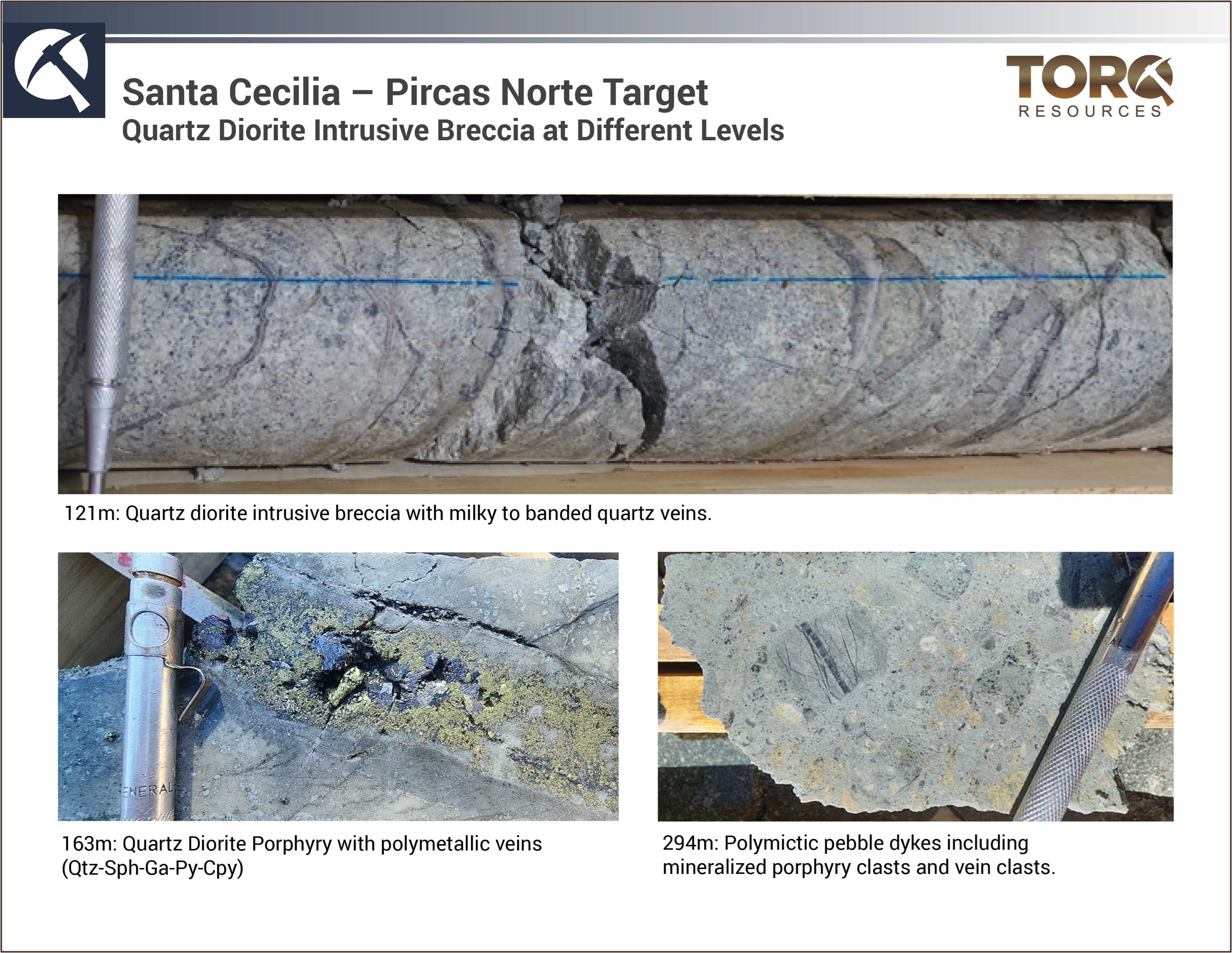
Figure 4: Illustrates select core photos from the upper portion of 24SC-DDH-003 at the Pircas Norte target.
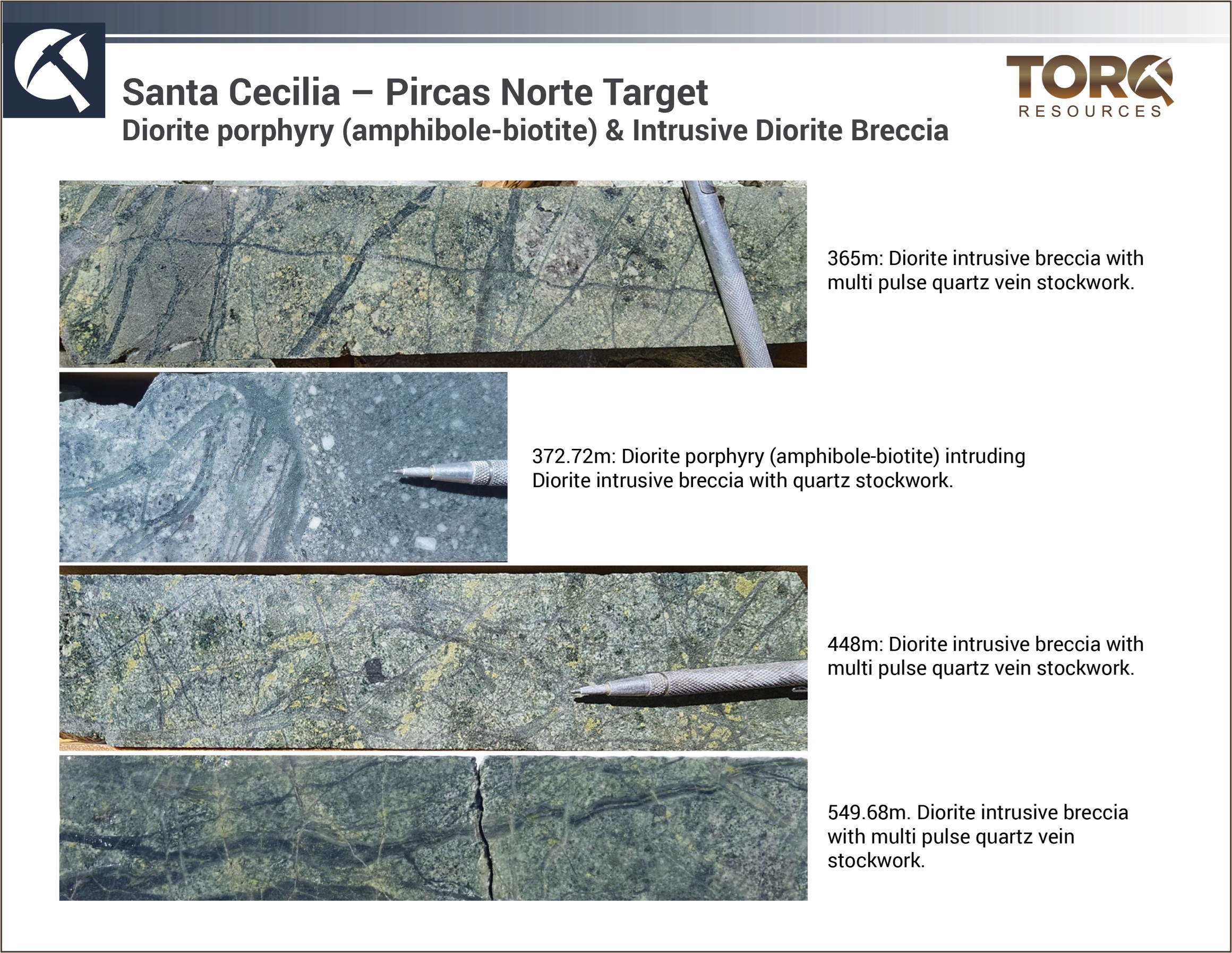
Figure 5: Illustrates select core photos from the lower portion of 24SC-DDH-003 from the Pircas Norte target.
Bryan Atkinson, P.Geo., is a "qualified person" within the meaning of Canadian mineral projects disclosure standards instrument 43-101 and has reviewed and approved the technical disclosures in this press release.
ON BEHALF OF THE BOARD,
Shawn Wallace
CEO & Chair
For further information on Torq Resources, please contact Natasha Frakes, VP, Communications, at (778) 729-0500 or [email protected].
About Torq Resources
Torq is a Vancouver-based copper and gold exploration company with a portfolio of premium holdings in Chile. The Company is establishing itself as a leader of new exploration in prominent mining belts, guided by responsible, respectful and sustainable practices. The Company was built by a management team with prior success in monetizing exploration assets and its specialized technical team is recognized for their extensive experience working with major mining companies, supported by robust safety standards and technical proficiency. The technical team includes Chile-based geologists with invaluable local expertise and a noteworthy track record for major discovery in the country. Torq is committed to operating at the highest standards of applicable environmental, social and governance practices in the pursuit of a landmark discovery. For more information, visit www.torqresources.com.
Santa Cecilia Drilling 2024
Analytical samples were taken by sawing PQ or HQ diameter core into equal halves on site and sent one of the halves to ALS Lab in Copiapó, Chile or La Serena, Chile for preparation and then to Santiago, Chile and Lima, Peru for analysis. All samples are assayed using 30 g nominal weight fire assay with AAS finish (Au-AA23) and multi-element using four acid digest ICP-AES/ICP-MS method (ME-MS61). QA/QC programs for 2024 core samples using internal standard samples and duplicates, lab duplicates, standards and blanks indicate good accuracy and precision in a large majority of standards assayed.
Forward Looking Information
This release includes certain statements that may be deemed "forward-looking statements". Forward-looking information in this release are statements that relate to plans for future exploration programs, which are dependent on raising additional capital. These statements involve known and unknown risks, uncertainties and other factors which may cause actual results, performance or achievements of the Company to be materially different (either positively or negatively) from any future results, performance or achievements expressed or implied by some of the principal forward-looking statements. See Torq's Annual Information Form filed March 27, 2023 at www.sedar.com for disclosure of the risks and uncertainties faced in this business.
Neither the TSX Venture Exchange nor its Regulation Services Provider (as that term is defined in the policies of the TSX Venture Exchange) assumes any responsibility for the adequacy or accuracy of this release.
SOURCE: Torq Resources Inc.




